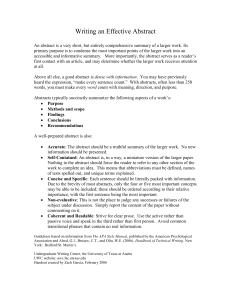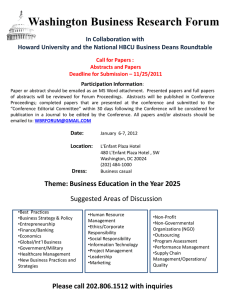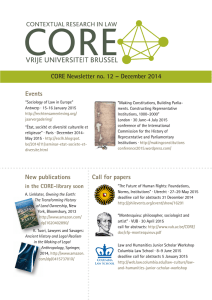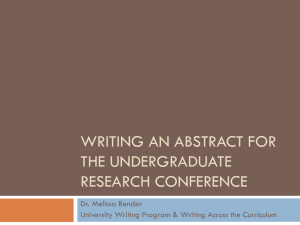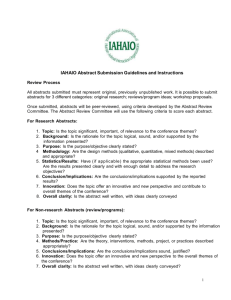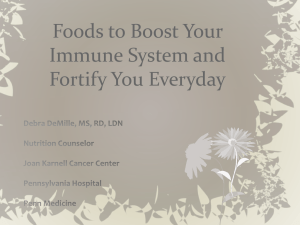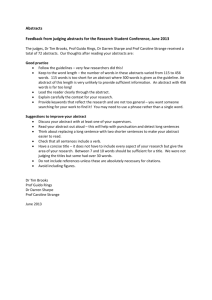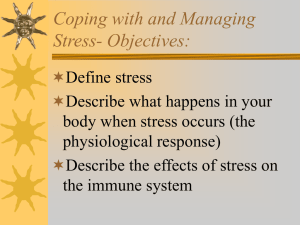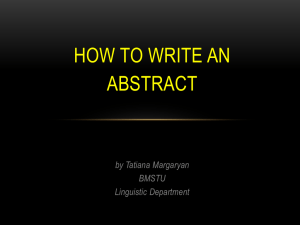document
advertisement
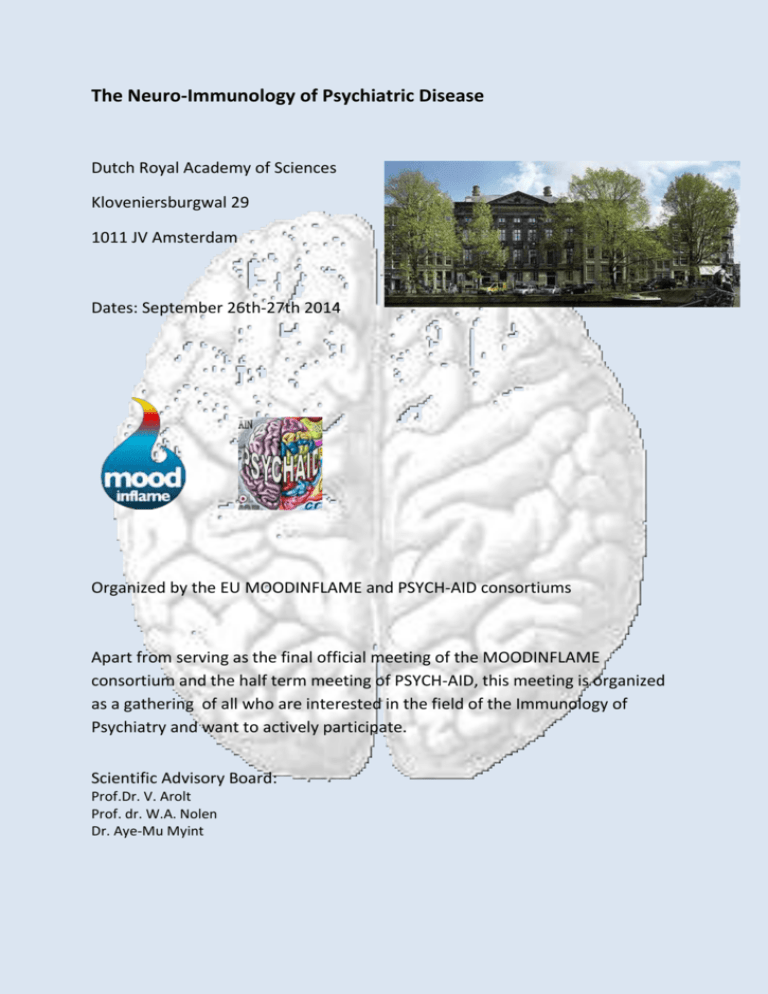
The Neuro-Immunology of Psychiatric Disease Dutch Royal Academy of Sciences Kloveniersburgwal 29 1011 JV Amsterdam Dates: September 26th-27th 2014 Organized by the EU MOODINFLAME and PSYCH-AID consortiums Apart from serving as the final official meeting of the MOODINFLAME consortium and the half term meeting of PSYCH-AID, this meeting is organized as a gathering of all who are interested in the field of the Immunology of Psychiatry and want to actively participate. Scientific Advisory Board: Prof.Dr. V. Arolt Prof. dr. W.A. Nolen Dr. Aye-Mu Myint Background There is increasing evidence that the immune system plays an important role in the pathogenesis of the various major mood disorders, schizophrenia and related syndromes. Over the past 5 years two major EU projects (MOODINFLAME and PSYCH-AID) have investigated the role of the immune system in psychiatric disease both in patients and animal models. Enormous progress has been made during these 5 years in and outside the projects. So, it is time to try and integrate the in MOODINFLAME/PSYCHAID gathered data with those of other psycho-neuro-immunologists to arrive at more comprehensive views and new working hypotheses. The one and a half day meeting in historic Amsterdam at the beautiful venue of the Dutch Royal Academy of Sciences at the Kloveniersburgwal is particularly meant to fulfil this aim. All scientists who are interested in the field of the Immunology of Psychiatry are cordially invited to attend and contribute to the meeting with presentations, posters and discussions. Particularly young investigators are invited to send in abstracts. The abstracts which fit the best into the already planned 4 sessions will be selected for oral presentation. There will be ample time to present the work on poster. Poster walks will be organized and posters will be integrally discussed in the general discussion at the end of each session. The fee has been kept at a minimum of 70,- Euro ( for the established researchers) and 30,Euro for PhD students, postdocs. For those related to MOODINFLAME or PSYCHAID projects the entrance fee is free. Amsterdam offers accommodation from economical to luxury/expensive, go to the general hotel web sites for booking your own accommodation. Contact address: Mrs Angelique van Rijswijk Department of Immunology Room Na-1101 Wytemaweg 80 3015 CN Rotterdam Tel: +10 7044092 Email: a.vanrijswijk@erasmusmc.nl Registration: Please complete the registration form included with this invitation and send this to Angelique van Rijswijk, a.vanrijswijk@erasmusmc.nl. Abstracts: A form for completing the abstract is included with this invitation. Program Session 1. The Immune Pathogenesis of Psychiatric Disease Friday, 26 september 2014, 9.00 hrs - 12.30 hrs Background will be provided on the lineage of monocytes/macrophages and T cells, their role in the inflammatory response and their support function for surrounding cells and the breakdown of these functions in two animal models of psychiatric disease (the MIA model and the NOD mouse model). 9.00-9.20 Leenen(Rotterdam): The differentiation and maturation of macrophages and dendritic cells from precursors and the M1/M2 concept. 9.20-9.40 Riksen/Netea (Nijmegen): Trained Immunity and epigenetic changes in monocytes/macrophages. A role in the inflammatory stress accompanying atherosclerosis? 9.40-10.00 Vergaelen/Claes (Leuven): 22q11 deletion syndrome, T cell deficiency, autoimmunity and psychiatric symptoms 10.00-10.15 McGuiness/Harkin (Dublin): The NOD mouse model of depressive-like behavior. The abnormal differentiation, maturation and inflammatory set point of the monocyte and microglia lineage 10.15-10.30 Bessis (Paris): The MIA model. The lack of the production of axon guidance molecules by inflammatory activated microglia 10.30-10.45 From abstracts selected presentation 10.45-11.00 From abstracts selected presentation 11.00-11.50 Coffee and poster session with organized poster walks 11.50-12.30 General structured discussion Lunch (12.30 hrs-13.30 hrs) Session 2. The Immune Profile in Psychiatric Disease Friday, 26 september 2014, 13.30 hrs - 17.00 hrs The abnormal set point, i.e. the abnormal expression of inflammation related genes, surface markers and cytokines) of monocytes, macrophages, microglia and T cells in psychatric patients will be presented and discussed in relation to disease phenotype and activity. 13.30-13.50 Sumaski/Arolt (Muenster): The profile of serum immune and growth factors in relation to immune cell abnormalities in major depression 13.50-14.10 Bergink/Drexhage(Rotterdam): Circulating monocytes and T cells in severe mood disorders 14.10-14.30 Benedetti (Milano): The profile of serum immune and growth factors in relation to imaging 14.30-14.45 Hillegers/Nolen (Utrecht): The immune profile in children at risk for a major mood disorder 14.45-15.00 Haarman/Nolen (Groningen): The Immune profile and PET scan in bipolar disorder 15.00-15.15 From abstracts selected presentation 15.15-16.00 From abstracts selected presentation 16.00-16.30 Coffee and poster session with organized poster walks 16.30-17.00 General structured discussion 17.00- 18.00 Key note lecture Prof. Wayne C. Drevets, M.D. 18.00-20.00 Social Event (Canal Boat Trip). Optional Session 3. Neuro-immuno-endocrine communication networks Saturday, 27 september 2014, 9.00 hrs - 12.30 hrs The interactive influence of the abnormally regulated immune system with other homoeostatic systems, such as with the HPA-axis, the tryptophan metabolism, the glucose metabolism, the dopaminergic system, etc. etc. will be presented and discussed. Special attention will be paid to the link with somatic comorbidities (such as the metabolic syndrome). Interventions aiming at altering the abnormal set point of the neuro-immunoendocrine system will also be presented and discussed . 9.00-9.20 Tomasik/Bahn (Cambridge): The profile of serum immune, growth and endocrine factors in psychiatric disease. Diagnostic and prognostic possibilities and impossibilities 9.20-9.40 Pariante (London): HPA-axis, steroid resistance and immune activation in major mood disorders 9.40-10.00 Myint (Brasschaat/Muenchen): The tryptophan break down pathway in relation to immune parameters in major psychiatric disease 10.15-10.30 Carvalho (London)/: Atherosclerosis and Depression 10.30-10.45 Pouwer (Tilburg): Diabetes and Depression 10.30-10.45 From abstracts selected presentation 10.45-11.00 From abstracts selected presentation 11.00-11.50 Coffee 11.50-12.30 Drexhage (R’dam): Summing up MOODINFLAME and PSYCHAID. 12.30-12.50 Weidinger/Muller: COX-2 inhibitors as a putative treatment for psychiatric disorders 12.50-13.10 deWitte/Sommers/Kahn: Anti-inflammatory treatment and schizophrenia End of the meeting Lunch (13.10 hrs-14.00 hrs) Symposium The Neuro- Immunology of Psychiatric Disease Amsterdam, The Netherlands 26 September – 27 September 2014 Registration Please fill out the registration form, deadline September 22nd 2014, fields marked with * are required. Male Female Title Initials * Family name * Address * Zip code * City * Country * Telephone * Email * Affiliation * Function Accreditation number Choose your registration type Moodinflame – Psychaid members free Established researchers € 70,00 PhD students Post-Docs € 30,00 Participation social programs Canal Boat Trip Amsterdam Friday September 26th 2014 Optional Yes No Symposium The Neuro- Immunology of Psychiatric Disease Amsterdam, The Netherlands 26 September – 27 September 2014 SUBMISSION OF ABSTRACTS General information •The deadline for abstract submission is September 1st 2014 •All abstracts must be submitted in the English language. •The instructions for abstract format and layout must be followed carefully and strictly. Instructions for abstract format and layout 1. The abstract should be structured with an introduction, M&M section, results and conclusion/discussion in bold. 2. Abstracts are limited to a maximum of 200 words, contain a title, a list of authors, the affiliations of the authors and an email address for contact. The name of the presenting author must be underlined. 3. The abstract must be written in Word 2010, Arial 11. 4. Author affiliations must be footnoted using the following symbols in that order (which should be used as superscripts): * , †, ‡, §, ¶. The affiliation must be in italic
